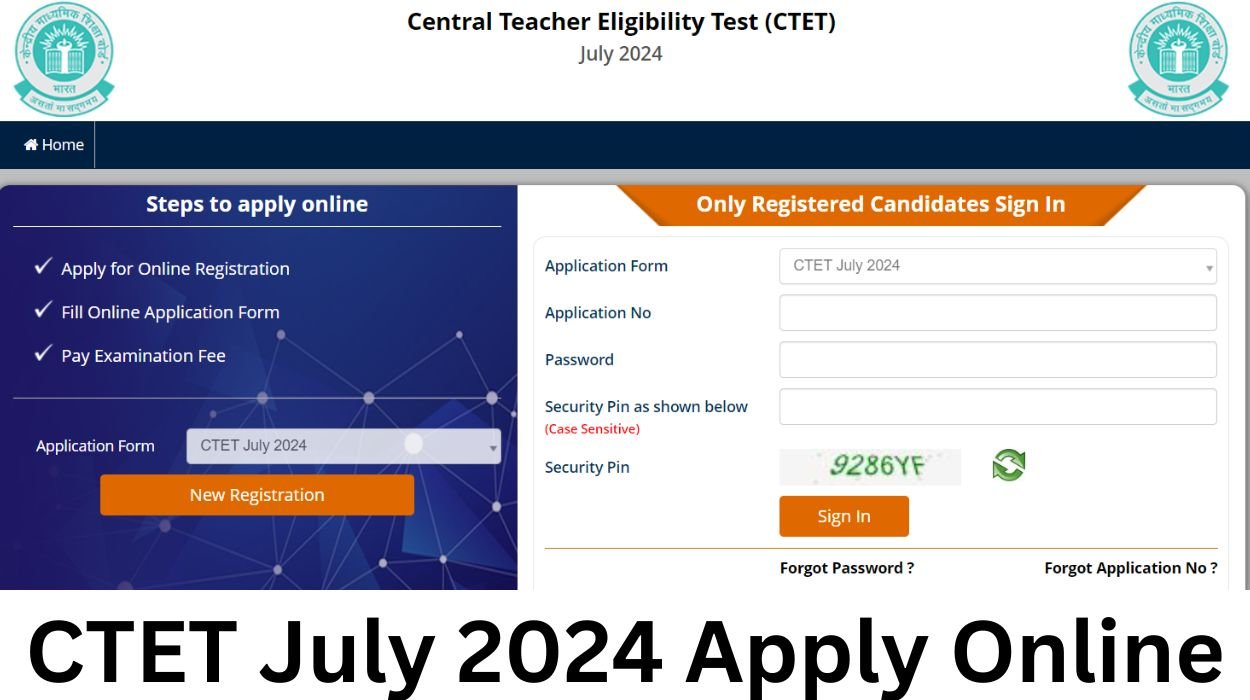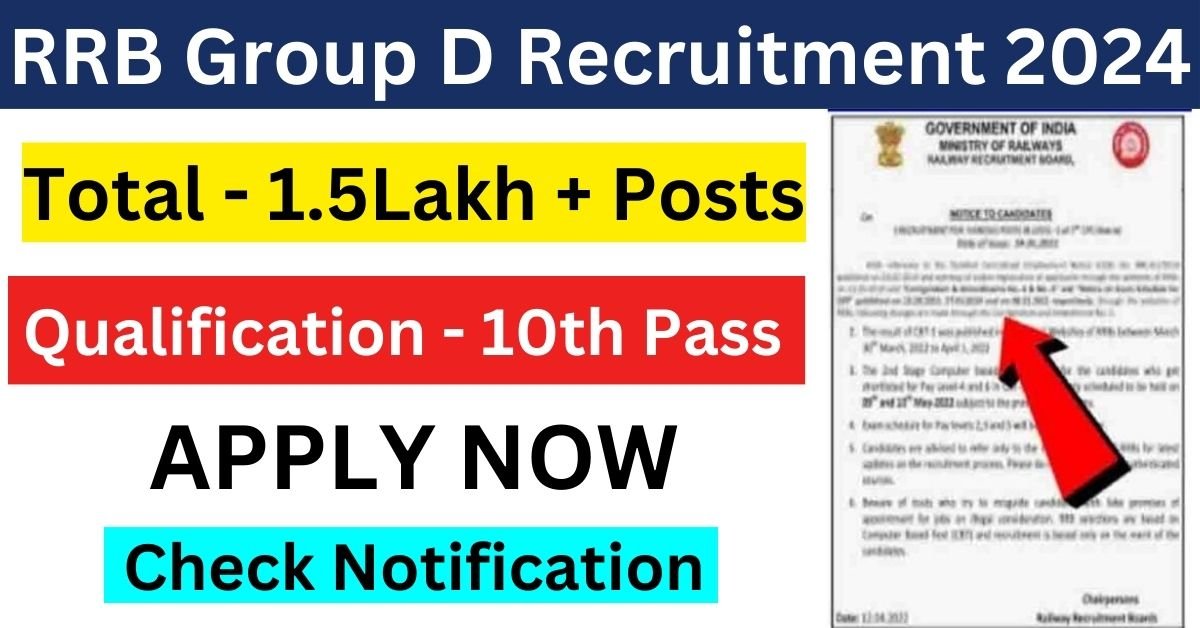CTET July 2024 Apply Online – The application process for the Central Teacher Eligibility Test CTET July 2024 has been started by the Central Board of Secondary Education CBSE. If you also want to apply for the post of teacher, then you can apply from 7th March to 2nd April 2024.
CTET July 2024 Information
| Exam Authority | Central Board of Secondary Education (CBSE) |
| Exam Name | Central Teacher Eligibility Test (CTET) |
| Month | July 2024 |
| Type of Exam | Eligibility Test |
| Mode of Application | Online |
| Last Date to Apply | 02 April 2024 |
| Official Website | ctet.nic.in |
CTET July 2024 Online Application Form 2024
| Events | Dates |
| CTET 2024 Notification Release Date | 07th March 2024 |
| CTET Application Form Started On | 07th March 2024 |
| CTET Apply Online Last Date | 02nd April 2024 (11:59 pm) |
| Last Date of Fee Submission | 02nd April 2024 (11:59 pm) |
| Final verification of payment of fee by bank | To be notified |
| Online Correction Schedule | To Be notified |
| CTET Exam Date 2024 | 07th July 2024 |
CTET July 2024 Application Fee
For Single Paper
- General / OBC / EWS: 1000/-
- SC / ST / PH : 500/-
For Both Paper Primary / Junior
- General / OBC / EWS: 1200/-
- SC / ST / PH : 600/-
| Category | Only For Paper I or II | For Both Paper I & II |
|---|---|---|
| General/OBC(NCL) | ₹1000/- | ₹1200/- |
| SC/ST/PwD | ₹500/- | ₹600/- |
Education Qualification
For Classes I-V (Paper I)
- Candidates must have passed Senior Secondary (or its equivalent) with at least 50% marks and completed or be in the final year of a 2-year Diploma in Elementary Education (D.El.Ed).
- Or candidates with at least 50% in Senior Secondary and the final year of a 4-year Bachelor of Elementary Education (B.El.Ed) or a 2-year Diploma in Education (Special Education).
For Classes VI-VIII (Paper II)
- Graduates who have completed or are in the final year of a 2-year Diploma in Elementary Education (D.El.Ed) are eligible.
- Or, Graduates with at least 50% marks and in the first year of Bachelor in Education (B.Ed) or candidates with 50% in Senior Secondary and the final year of a 4-year Bachelor in Elementary Education (B.El.Ed) or 4-year B.A/B.Sc.Ed or B.A.Ed/B.Sc.Ed.
How to Fill
- Central Board of Secondary Education CBSE Are Released the Central Teacher Eligibility Test CTET Paper I to V & VI to VIII Exam July 2024. Candidate Can Apply Online 07/03/2023 to 02/04/2024.
- Candidate Read the Notification Before Apply the Teacher Eligibility Test Application Form in Central TET CTET Exam Latest Online Form for July 2024.
- Important Document – Eligibility, ID Proof, Address Details, Basic Details,Photo, Sign, ID Proof, Etc.
- Before Submit the Application Form Must Check All Details Carefully.
- If Candidate Required to Paying the Application Fee Must Submit. If You have Not the Required Application Fees Your Form is Not Completed.
- Take A Print Out of Final Submitted Form.
CTET July 2024 Selection Process
- Written Exam
- 60% Marks Obtain in Tet Exam 2024 who qualify
CTET July 2024 Exam Pattern 2024 Paper -1
| Subjects | Question | Marks |
| Child Development and Pedagogy(compulsory) | 30 Question | 30 Marks |
| Mathematics (compulsory) | 30 Questions | 30 Marks |
| Environmental Studies (compulsory) | 30 Questions | 30 Marks |
| Language 1st | 30 Questions | 30 Marks |
| Language 2nd | 30 Questions | 30 Marks |
| Total | 150 Questions | 150 Marks |
CTET July 2024 Exam Pattern 2024 Paper -2
| Subjects | Question | Marks |
| Child Development and Pedagogy(compulsory) | 30 Question | 30 Marks |
| Mathematics and Science | 60 Questions | 60 Marks |
| Mathematics and Science teacher | 60 Questions | 60 Marks |
| Social Studies/Social Science | 60 Questions | 60 Marks |
| Language 1st | 30 Questions | 30 Marks |
| Language 2nd | 30 Questions | 30 Marks |
CTET Syllabus Languages
| English | Hindi |
| Sanskrit | Punjabi |
| Urdu | Bangla |
| Manipuri | Tamil |
| Marathi | Mizo |
| Nepali | Oriya |
| Khasi | Malayalam |
| Telugu | Tibetan |
| Garo | Assamese |
| Gujarati | Kannada |
CTET Syllabus 2024 for Paper 1
a) Child Development (Primary School Child): 15 Questions
- Concept of development and its relationship with learning
- Principles of the development of children
- Influence of Heredity & Environment
- Socialization processes: Social world & children (Teacher, Parents, Peers)
- Piaget, Kohlberg and Vygotsky: constructs and critical perspectives
- Concepts of child-centred and progressive education
- Critical perspective of the construct of Intelligence
- Multi-Dimensional Intelligence
- Language & Thought
- Gender as a social construct; gender roles, gender-bias and educational practice
- Individual differences among learners, understanding differences based on diversity of language, caste, gender, community, religion etc.
- The distinction between Assessment for learning and assessment of learning; School-Based Assessment, Continuous & Comprehensive Evaluation: perspective and practice
- Formulating appropriate questions for assessing readiness levels of learners; for enhancing learning and critical thinking in the classroom and for assessing learner achievement.
b) Concept of Inclusive education and understanding children with special needs: 5 Questions
- Addressing learners from diverse backgrounds including disadvantaged and deprived
- Addressing the needs of children with learning difficulties, ‘impairment’ etc.
- Addressing the Talented, Creative, Specially abled Learners
c) Learning and Pedagogy: 10 Questions
- How children think and learn; how and why children ‘fail’ to achieve success in school performance.
- Basic processes of teaching and learning; children’s strategies of learning; learning as a social activity; social context of learning.
- Child as a problem solver and a ‘scientific investigator’
- Alternative conceptions of learning in children, understanding children’s ‘errors’ as significant steps in the learning process.
- Cognition & Emotions
- Motivation and learning
- Factors contributing to learning – personal & environmental.
II. Language I Syllabus- 30 Questions
a) Language Comprehension: 15 Questions
Reading unseen passages – two passages one prose or drama and one poem with questions on comprehension, inference, grammar and verbal ability (Prose passage may be literary, scientific, narrative or discursive)
b) Pedagogy of Language Development: 15 Questions
- Learning and acquisition
- Principles of language Teaching
- Role of listening and speaking; function of language and how children use it as a tool
- A critical perspective on the role of grammar in learning a language for communicating ideas verbally and in written form
- Challenges of teaching language in a diverse classroom; language difficulties, errors and disorders
- Language Skills
- Evaluating language comprehension and proficiency: speaking, listening, reading and writing
- Teaching-learning materials: Textbook, multi-media materials, multilingual resource of the classroom
- Remedial Teaching
III. Language II Syllabus- 30 Questions
a) Comprehension: 15 Questions
Two unseen prose passages (discursive or literary or narrative or scientific) with questions on comprehension, grammar and verbal ability
b) Pedagogy of Language Development: 15 Questions
- Learning and acquisition
- Principles of language Teaching
- Role of listening and speaking; function of language and how children use it as a tool
- A critical perspective on the role of grammar in learning a language for communicating ideas verbally and in written form;
- Challenges of teaching language in a diverse classroom; language difficulties, errors and disorders
- Language Skills
- Evaluating language comprehension and proficiency: speaking, listening, reading and writing
- Teaching-learning materials: Textbook, multi-media materials, multilingual resource of the classroom
- Remedial Teaching
IV. Mathematics Syllabus- 30 Questions
a) Content: 15 Questions
- Geometry
- Shapes & Spatial Understanding
- Solids around Us
- Numbers
- Addition and Subtraction
- Multiplication
- Division
- Measurement
- Weight
- Time
- Volume
- Data Handling
- Patterns
- Money
b) Pedagogical issues: 15 Questions
Nature of Mathematics/Logical thinking; understanding children’s thinking and reasoning patterns and strategies of making meaning and learning
- Place of Mathematics in Curriculum
- Language of Mathematics
- Community Mathematics
- Valuation through formal and informal methods
- Problems of Teaching
- Error analysis and related aspects of learning and teaching
- Diagnostic and Remedial Teaching
V. Environmental Studies Syllabus- 30 Questions
a) Content: 15 Questions
I. Family and Friends:
• Relationships
• Work and Play
• Animals
• Plants
II. Food
III. Shelter
IV. Water
V. Travel
VI. Things We Make and Do
b) Pedagogical Issues: 15 Questions
- Concept and scope of EVS
- Significance of EVS, integrated EVS
- Environmental Studies & Environmental Education
- Learning Principles
- Scope & relation to Science & Social Science
- Approaches of presenting concepts
- Activities
- Experimentation/Practical Work
- Discussion
- CCE
- Teaching material/Aids
- Problems
CTET Syllabus 2024 for Paper 2
a) Child Development (Elementary School Child): 15 Questions
- Concept of development and its relationship with learning
- Principles of the development of children
- Influence of Heredity & Environment
- Socialization processes: Social world & children (Teacher, Parents, Peers)
- Piaget, Kohlberg and Vygotsky: constructs and critical perspectives
- Concepts of child-centred and progressive education
- Critical perspective of the construct of Intelligence
- Multi-Dimensional Intelligence
- Language & Thought
- Gender as a social construct; gender roles, gender-bias and educational practice
- Individual differences among learners, understanding differences based on diversity of language, caste, gender, community, religion etc.
- The distinction between Assessment for learning and assessment of learning; School-Based Assessment, Continuous & Comprehensive Evaluation: perspective and practice
- Formulating appropriate questions for assessing readiness levels of learners; for enhancing learning and critical thinking in the classroom and for assessing learner achievement.
b) Concept of Inclusive education and understanding children with special needs: 5 Questions
- Addressing learners from diverse backgrounds including disadvantaged and deprived
- Addressing the needs of children with learning difficulties, ‘impairment’ etc.
- Addressing the Talented, Creative, Specially abled Learners
c) Learning and Pedagogy: 10 Questions
- How children think and learn; how and why children ‘fail’ to achieve success in school performance.
- Basic processes of teaching and learning; children’s strategies of learning; learning as a social activity; social context of learning.
- Child as a problem solver and a ‘scientific investigator’
- Alternative conceptions of learning in children, understanding children’s ‘errors’ as significant steps in the learning process.
- Cognition & Emotions
- Motivation and learning
- Factors contributing to learning – personal & environmental
II. Language I Syllabus- 30 Questions
To test the candidate’s knowledge in the language they have opted there will be 30 questions in the CTET Paper-I and Paper-II.
a) Language Comprehension: 15 Questions
Reading unseen passages – two passages one prose or drama and one poem with questions on comprehension, inference, grammar and verbal ability.
b) Pedagogy of Language Development: 15 Questions
- Learning and acquisition
- Principles of language Teaching
- Role of listening and speaking; function of language and how children use it as a tool
- A critical perspective on the role of grammar in learning a language for communicating ideas verbally and in written form; Challenges of teaching language in a diverse classroom; language difficulties, errors and disorders
- Language Skills
- Evaluating language comprehension and proficiency: speaking, listening, reading and writing
- Teaching-learning materials: Textbook, multi-media materials, multilingual resources of the classroom
- Remedial Teaching
III. Language II Syllabus- 30 Questions
a) Comprehension: 15 Questions
Two unseen prose passages (discursive or literary or narrative or scientific) with questions on comprehension, grammar and verbal ability
b) Pedagogy of Language Development: 15 Questions
- Learning and acquisition
- Principles of language Teaching
- Role of listening and speaking; function of language and how children use it as a tool
- A critical perspective on the role of grammar in learning a language for communicating ideas verbally and in written form; Challenges of teaching language in a diverse classroom; language difficulties, errors and disorders
- Language Skills
- Evaluating language comprehension and proficiency: speaking, listening, reading and writing
- Teaching-learning materials: Textbook, multi-media materials, multilingual resource of the classroom
- Remedial Teaching
IV. (A) Mathematics and Science Syllabus- 60 Questions
(i) Mathematics: 30 Questions
a) Content: 20 Questions
- • Number System
- • Knowing our Numbers
- • Playing with Numbers
- • Whole Numbers
- • Negative Numbers and Integers
- • Fractions
- • Algebra
- • Introduction to Algebra
- • Ratio and Proportion
- • Geometry
- • Basic geometrical ideas (2-D)
- • Understanding Elementary Shapes (2-D and 3-D)
- • Symmetry: (reflection)
- • Construction (using Straight edge Scale, protractor, compasses)
- • Mensuration
- • Data handling
b) Pedagogical issues: 10 Questions
• Nature of Mathematics/Logical thinking
• Place of Mathematics in Curriculum
• Language of Mathematics
• Community Mathematics
• Evaluation
• Remedial Teaching
• Problem of Teaching
(ii) Science: 30 Questions
a) Content: 20 Questions
I. Food
• Sources of food
• Components of food
• Cleaning food
II. Materials
• Materials of daily use
III. The World of the Living
IV. Moving Things People and Ideas
V. How things work
• Electric current and circuits
• Magnets
VI. Natural Phenomena
VII. Natural Resources
b) Pedagogical issues: 10 Questions
• Nature & Structure of Sciences
• Natural Science/Aims & objectives
• Understanding & Appreciating Science
• Approaches/Integrated Approach
• Observation/Experiment/Discovery (Method of Science)
• Innovation
• Text Material/Aids
• Evaluation – cognitive/psychomotor/affective
• Problems
• Remedial Teaching
V. Social Studies/Social Sciences Syllabus- 60 Questions
I. History
• When, Where and How
• The Earliest Societies
• The First Farmers and Herders
• The First Cities
• Early States
• New Ideas
• The First Empire
• Contacts with Distant lands
• Political Developments
• Culture and Science
• New Kings and Kingdoms
• Sultans of Delhi
• Architecture
• Creation of an Empire
• Social Change
• Regional Cultures
• The Establishment of Company Power
• Rural Life and Society
• Colonialism and Tribal Societies
• The Revolt of 1857-58
• Women and reform
• Challenging the Caste System
• The Nationalist Movement
• India After Independence
II. Geography
• Geography as a social study and as a science
• Planet: Earth in the solar system
• Globe
• Environment in its totality: natural and human environment
• Air
• Water
• Human Environment: settlement, transport and communication
• Resources: Types-Natural and Human
• Agriculture
III. Social and Political Life
• Diversity
• Government
• Local Government
• Making a Living
• Democracy
• State Government
• Understanding Media
• Unpacking Gender
• The Constitution
• Parliamentary Government
• The Judiciary
• Social Justice and the Marginalised
b) Pedagogical issues
• Concept & Nature of Social Science/Social Studies
• Class Room Processes, activities and discourse
• Developing Critical thinking
• Enquiry/Empirical Evidence
• Problems of teaching Social Science/Social Studies
• Sources – Primary & Secondary
• Projects Work
• Evaluation
Important Links
| Apply Online | Click Here | |||
| Download Notification | Click Here | |||




